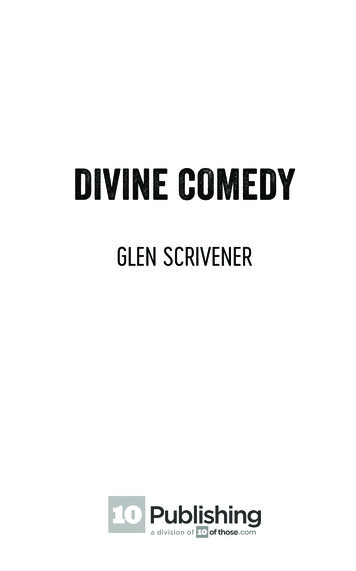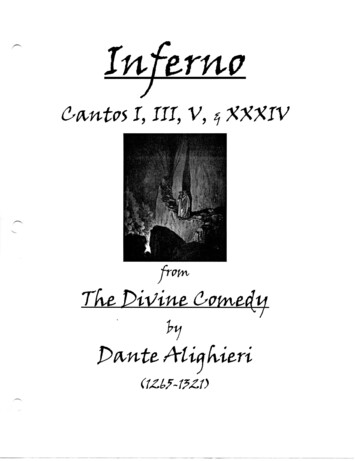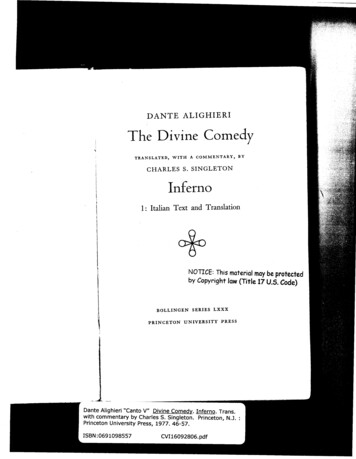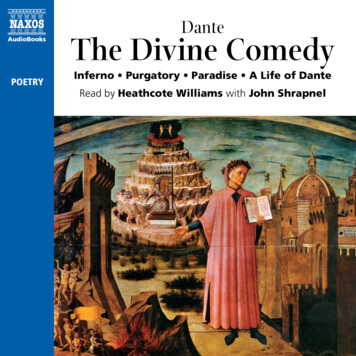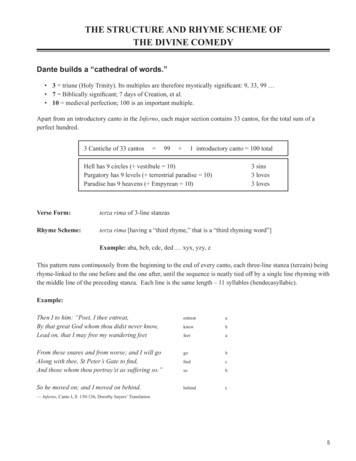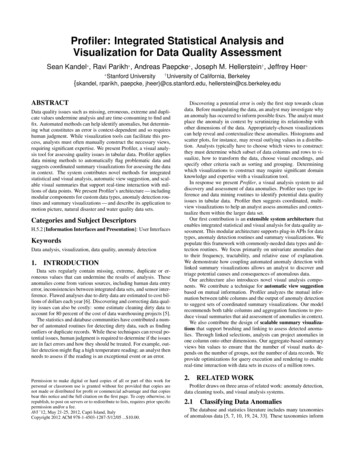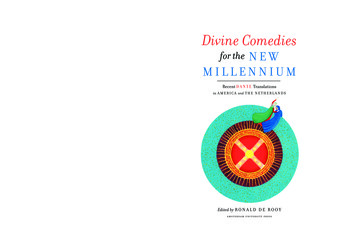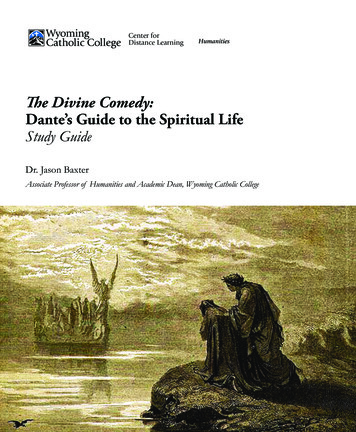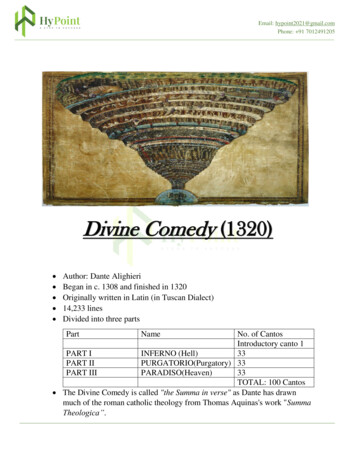
Transcription
CAT 124/125DIVINE COMEDYA Practicum, Writing Workshop & Critical Analysis in Modern American Stand-up ComedyAlso known as: Dirty Words, Pig Newtons & More Monkeys For MeSPRING QUARTER 2016Daphne Taylor-Garcia, PhD in Ethnic StudiesKiik Araki-Kawaguchi, MFA in Writingdtg@ucsd.eduharakika@ucsd.eduThis will not be a course on how to be funny. It will also not be a fanboy class on LouisCK and Dave Chappelle. This will also not be a course on the work of Medieval Italianpoet Dante Alighieri. I just needed to borrow and profane the name of his epic poem“The Divine Comedy” for the selfish reason of creating a catchy course title.I just want to be upfront about this now so none of you get mean or grumpy halfwaythrough the quarter.That being said, I expect we will all do a lot of laughing. One of my last teachingevaluations said, “If nothing else, we really laughed at him a lot. Especially his haircut.”We will definitely watch or listen to work by Margaret Cho, Wanda Sykes, PatriceO’Neal, Roseanne Barr, George Carlin, George Lopez, Aziz Ansari, Chelsea Peretti, SarahSilverman, Gabriel Iglesias, Louis CK and Dave Chappelle (with a critical lens). And DanteAlighieri will still have nothing to do with this class. He’s dead.Still here? Ok cool . . .This course will combine the concerns of the 124 Practicum (experiential andcommunity-based learning) with the concerns of a CAT 125 course (public rhetoric,practical communication/writing, professional development, social media).You will write, research for, analyze, workshop and perform stand-up comedy material.Let me repeat that last part. You will perform stand-up comedy material weekly. You donot have to be able to get laughs or be comfortable on stage in order to get an A. You dohave to be brave, respectful and a hard worker.You will not only be asked to critique our class texts, but also conceive and develop yourstand-up material AS A FORM OF social/cultural/media critique.I should elaborate on this point. When I said earlier this class is not all about becomingfunny, I wasn’t joking. If all you care about is getting big-belly laughs and don’t mind
2doing it at the expense of another person’s race, gender, sexuality, disability, class,culture, etc. – then you shouldn’t take this class. This course will be much moreinterested in forging a productive dialogue between the speaker and the issues of race,gender and sexuality. Your writing and performance will be subject to a variety ofconstraints (for ex. No derogatory slurs that demean another person based on theircolor, nation, culture etc.)We’re not asking you to hold all your punches. We are going to ask you to take a lot ofrisks. We are going to discuss these risks. And we want to defend your right to takethem. At the same time we should always be considering this problem, thiscontradiction of comedy. The comedy we’re going to be confronting (and producing)hinges on a contradiction between the offensive and the critical. The centralcontradiction of standup comedy – of anti-racist, anti-sexist, anti-colonial comedy – isthat racism, sexism, colonialism, homophobia are ugly phenomena and pressingconcerns. At the same time, there is an internal ridiculousness of these phenomena thatmake us laugh. The confrontation of tragedy can provoke laughter. So can thedemystification of incredibly dark desires.You are going to continually ask yourself questions like these: How can you be funny andcritical about racism without advertising racism? How can you be funny about violencewithout undermining the consequence of violence?The concerns of the best stand-up comedians will also be our concerns – racism, sexism,violence, colonialism, homophobia, class disparity, disability, and more. But don’t feelyou already have to be a scholar of these subjects to take this course. It is moreimportant that you keep and open mind and be ready to struggle.We will also be concerned with the ethics of contemporary stand-up comedy (for ex.gender inequality for professional comedians). This is something of a class creatingcomedy that is taking comedy as its subject.You will also develop written analyses that chart your thinking/progress and place yourprojects within a critical framework. You will participate in studio critiques,lab/workshop hours, engage with films, texts and critical theory.In general you will perform weekly at a “comedy in progress” night and engage with theon-campus UCSD undergraduate and graduate student communities. On the occasionsyou don’t perform at a scheduled event, you will instead publicize for and perform atother public events. For example you will have a midterm performance at an open-micnight that you will research and visit within your “comedy families.” The final comedyshowcase will take place at a UCSD venue (likely the Cross Cultural Center).For your FINAL performance, you will draw upon your previous projects, and select yourstrongest 2-4 minutes of work to perform. You will also design a calling card schwag
3ornament to give out at the festival that will advertise/brand your creative work/vision.This performance will take place at a public, on-campus location.At some point in the quarter, your “comedy family” is required to make a visit to acomedy club and write a collective reflection/critique of the performance. You don’tneed to break the bank on this. I suggest you all put yourselves on the email list at TheMadhouse Comedy Club. Madhouse frequently offers free tickets for their shows andfeatures a fairly eclectic group of performers. Lestat’s Coffeehouse on Adams also doesa free comedy show on Tuesday evenings.Every student will develop an online portfolio throughout the quarter. As a finishingtouch you will re-purpose your artist memos (another name for these might be processstatements) into an “About” section on your website that will discuss your body of workfrom a curatorial point-of-view. You will do this with attention to the research, texts,discussions, critical practices and cultural references that influenced you throughout thequarter.MEETING TIMES:All meeting times take place on . . .SECTIONS .tbaLECTURE .tbaSEMINAR .tbaOFFICE HOURS .tbaCOURSE TEXTSYou are not required to BUY any texts for this course. We are trying to keep things ascheap as possible. Your readings will be available online, on TED or as handouts.BUT – You are required to print out reading materials when they are scanned/uploadedto TED and you are required to have these materials on hand during class. Whenfamilies are being workshopped, you are required to print out their work (usually jokescripts), make marginalia, and come prepared to talk about their pieces. You arerequired to print out the 2 critiques you write up for Monday afternoons. Buy your ownstapler. Be prepared to spend about 5 on a stapler and 25 on copies this quarter.AND – You are required to have access to a Netflix account for the quarter. This isbecause several of your required texts are standup comedy specials and will be availablestreaming through this service. This may cost you somewhere between 16- 24
4SOCIAL MEDIAYou are required to maintain your presence on TED this quarter throughblogs/discussion boards. A lot of communication (updates, clarifications, changes tosyllabus) will take place at the beginnings of discussion and in email form. So make sureto be at discussion sections on time, and make sure to check your email regularly.You are also required to create and maintain the following forms of social media for thiscourse:TwitterYour Twitter will fill at least two roles during the quarter. First it will be an archive of thequotes, passing ideas, confrontations, dialogues, etc. that will document your criticalthinking and process during the quarter.It will also help publicize and document your performances and the performances ofyour comedy family members.I have built my own Twitter to document this class along the way .com/signup)WordPressYour WordPress will help represent you as an artist, performer, writer, etc.Take a look at this page for ideas - http://www.miciamosely.com/comedy/I have also built my own WordPress to illustrate some of the concepts we’ll press.com/website/?source google&campaign hsb&utm content DisURLWebsite&utm campaign ExactWordPress&gclid CKuppvGZsr0CFVKIfgodWJoAVA)Vimeo OR YouTubeYou will have to post video of your performances on your WordPress site and may needa YouTube or Vimeo account to handle easy uploads.You may have to create a YouTube account in order to view some of the materials wewant to discuss this quarter.(https://vimeo.com/join?gclid CPWDz8qdsr0CFY6RfgodTEAAZg&dclid CO agcydsr0CFQuhhQodg3AAvw
5COMIC FAMILYAt the beginning of the quarter, you will all take part in choosing your “comic family.”Your comic family are the people who support you while working on new material. Theywill help document your work while you are on stage. You will collaborate with them,workshop with them, meet with them outside of class to view/listen to comedy specials,etc. In class we will frequently break into “families” in order topitch/perform/critique/develop our class projects.You have an obligation to be honest and supportive to the members of your family. Youshouldn’t let them perform material you think is mediocre or problematic. You areexpected to give them productive feedback in the form of written notes, classdiscussions and platonic coffee dates. To open up discussions, I may call on you tointroduce the work of someone in your family.For your MIDTERM assignment, you and your comic family will schedule/coordinate anevening to visit a local open mic event together, perform, and help document (video)each others’ performances. You should give the members of your family props for beingon stage. You should defend them from hecklers. When you settle on a time/place youshould let our entire class know – as some of us might want to come out to support yourfamily as well.Write down the names of the different comic families below.Family 1:Family 2:Family 3:Family 4:Family 5
6GRADING124 Evaluation:Remix Comic Routine Script & Analysis .5%Write Out Loud/Themed Routine Script & Submission to “So Say We All” . 10%IGNITE Script and performance(“Comedic How-To”) . 10%Weekly live performance hours . . .15%Workshop .30%Workshop grade includes: workshop attendance and participation, critiques, familyharmony (you will assess this and I will assign part of it)Open-Mic Midterm.15%Standup Comedy Festival Performance & Schwag .15%125 Evaluation:Attendance in sections .25%“Dear Elvis” Letters (Artist Memos) .30%Live Comedy Visit & Critique .15%Online Portfolio . . 30%BREAKDOWN of Online Portfolio:Curated links, Link to Twitter, Contact, Additional page of your choosing . .10%Standup Video Clip Curation & Introduction .10%“About” Section of Online Portfolio.10%Curated links should demonstrate expertise and be a draw for people to access yourpage.Additional page might be something like:Funny storiesJoke of the day/knock knock jokesSomething totally random for comedic effect – for ex. a page on desert plants and birdsor another idiosyncratic interestALSO INCLUDED in Online Portfolio:Sample jokes (scripts)Performances (YouTube or Vimeo)Blog/reflections (usually this is the “Home” page)Tools for comedians/joke utility beltSlam a heckler
7Attendance and ParticipationPlease plan to be on time and engaged in section/workshop/lecture. You will be allowedtwo absences before your grade drops dramatically. Dramatically. Yes, I am writingthat word twice to scare you.Excessive absences and tardiness will be grounds for failure in the course. Continuoususe of electronic devices not connected to the class will significantly affect yourparticipation grade.Attendance/participation is more than being in the chair physically. Being in the chairphysically is of course an essential part of it. But I also want you to be generous withyour peers. I want you to help each other learn. That generosity is coming to class readyto engage with the material and your classmates’ ideas about the material. Oneinformal rule I have is that I want everyone to try and talk at least once during ourdiscussions. It’s not about making you feel nervous or uncomfortable – it’s about youhaving a perspective and knowledge that is valuable – so share/collaborate with us.Course WebsiteImportant information for the class can be found on the course website athttp://ted.ucsd.edu. Your user name and password is the same used to login toTritonlink. Make sure that you can login to the system by the first day of class. A copyof this syllabus, assignment details and important reminders will be posted to the site.We may alter the syllabus during the course of the quarter. Any changes made will beposted to the TED website.Course ReadingsAlmost all course readings and materials will be posted on our class web site(http://ted.ucsd.edu), as indicated in the schedule of readings.Complete readings by the beginning of the class for which they are assigned.Proxy serverPlease note: Access to the TED and reserves websites may be restricted to UCSD IPaddresses.To access the reserves materials off campus you must use UCSD’s “proxy id/ for more info. Alternatively, you maylogin from off-campus using the Virtual Private Network. Details to configure VPN foundhere: e-access/vpn-virtual-privatenetwork.html
8UCSD Principles of CommunityThe CAT program fully supports the UCSD Principles of Community. Please take amoment to review them as part of our code of conduct for the .htmlhttp://www.ucsd.edu/ files/POC Spanish.pdfAcademic IntegrityYou are expected to uphold the standards of academic integrity in all your work.UCSD has a university-wide Policy on Integrity of Scholarship, which can be found onlineat htm. All students must readand be familiar with this Policy. All suspected violations of academic integrity will bereported to UCSD’s Academic Integrity Coordinator. Students found to have violatedUCSD’s standards for academic integrity may receive both administrative and academicsanctions. Administrative sanctions may extend up to and include suspension ordismissal, and academic sanctions may include failure of the assignment or failure of thecourse.Specific examples of prohibited violations of academic integrity include the following:(although this should in no way be considered an exhaustive list of examples):Academic stealing refers to the theft of exams or exam answers, of papers or take-homeexams composed by others, and of research notes, computer files, or data collected byothers.Academic cheating, collusion, and fraud refer to having others do your schoolwork orhelping or allowing them to present your work as their own; using unauthorizedmaterials during exams; inventing data or bibliography to support a paper, project, orexam; purchasing tests, answers, or papers from any source whatsoever; submitting(nearly) identical papers to two classes. Helping other students to cheat or steal is alsocheating.Misrepresenting personal or family emergencies or health problems in order to extenddeadlines and alter due dates or requirements is another form of academic fraud.Claiming you have been ill when you were not, claiming that a family member has beenill or has died when that is untrue are some examples of unacceptable ways of trying togain more time than your fellow students have been allowed in which to completeassigned work.Plagiarism refers to the use of another’s work without full acknowledgment, whether bysuppressing the reference, neglecting to identify direct quotations, paraphrasing closelyor at length without citing sources, spuriously identifying quotations or data, or cuttingand pasting the work of several (usually unidentified) authors into a singleundifferentiated whole.
9WEEK ONEMONDAYSections: Learning each others’ namesChris Bliss TED TalksHow to access materials on TED andelsewhere for this classWatch:Netflix: Aziz Ansari“Dangerously Delicious”Ian Bogost “The Cocktail Party Test”Research, write andpractice:Remix Comedyperformance scriptIn class: Write draft of your artist biosand bring this to lectureLecture: Tracing your comedic lineageSyllabusScripting a jokeBegin THE GRID of types of jokesCREATE:Twitter and WordPressIn class: write down 3 hypotheticalheckles and 3 responsesWEDNESDAYIntroduce Remix Comedy promptSections: Creating the vocabulary of thisprojectAnd: How do we want toworkshop/critique?4-6pm: Remix Comedy PerformancesWrite your “Dear Elvis” artist memo andpost it to your TED blogGet in pairs of 2s and 3sDiscuss what your goals for this courseare and if they’ve changed afterperformingCreate comedy families and sign up forworkshop timePresentation on some of the joke speciesRead:The Comedy Bible, “Jokestructure” pgs. 69-100Watch:Netflix: Mike Birbiglia“What I Should Have SaidWas Nothing”Tig Notaro“This American Life –Taylor Dayne Story”Post by Sunday, 4/6, 5pm:750-Word Draft of scriptfor “So Say We All” Prompt
10WEEK TWOMONDAYSections: Your story, your expertise,cocktail party introductionLecture:Comedy as rhetoric: identifying audienceand purposeHow not to advertise stereotypesWEDNESDAYRead:Richard Delgado:“Storytelling forOppositionists and Others:A Plea for Narrative”Chinua Achebe“Foreward”Workshop Families “So Say We All” DraftWatch:YouTube: Dave Chappelle“Killin’ Them Softly”Sections: Discussion of Delgado andAchebeRead:We Want To#CancelColbertLecture:Professor Wayne Yang will give his lectureon master v. counter-narrative: How notto be ventriloquized through like adummy“So Say We All” PerformancesChristopher Mah “I don’tsee race”Watch:Feminist Frequency “IronicAdvertising” and “TheStraw Feminist” and“Women in Refrigerators”Lisa Lampanelli “Improv”Louis CK “Chewed Up”Post by Sunday, 4/13,5pm:Draft of Porters 1 set using3-4 joke species of yourchoosing
11WEEK THREEMONDAYSections: Discussion of FeministFrequency, and We Want To#CancelColbertWorkshop Families for Porter’sPerformancesRead:Judy Carter “Comedy . . . BeAfraid, Be Very Afraid”Lindy West “An OpenLetter to White MaleComedians” & “How (not)to Make a Rape Joke”articles, video andcommentsWatch:Daniel ToshWanda Sykes “Imma BeMe”WEDNESDAYSections: Discussion of FeministFrequency and “We Want To#CancelColbert”Lecture:Performances at 4pm at CCC(Comunidad Room Lg)Critiques Dear ElvisRead: Lindy West “An OpenLetter to White MaleComedians” & “How (not)to Make a Rape Joke”articles, video andcomments (Divine ComedyWordPress)Watch: Sarah Silverman“Jesus is Magic” (YouTube)Prompt 4Gabriel Iglesias “Hot andFluffy” (Netflix)
12WEEK FOURMONDAYSections: Quiz and discussion of LindyWest “An Open Letter to White MaleComedians” & “How (not) to Make aRape Joke” articles, video and commentsRead: Christopher Mah “Idon’t see race”Watch: Iliza Shlesinger“War Paint” (Netflix)Lecture: WorkshopWEDNESDAYSections: Finish discussion of Lindy West“An Open Letter to White MaleComedians” & “How (not) to Make aRape Joke” articles, video and commentsLecture:Residency Performances 2Note: You must find a way to film andupload your performance to yourWordPressPrompt 5Margaret Cho “Beautiful”(Netflix)Read: “De-Tangling Racism:On White Women andBlack Hair” Crunk FeministCollectiveListen:Meet with your group andlisten to Steve Martin“Born Standing Up”Watch:The Muslims Are Coming!(Netflix)Felipe Esparza “They’re NotGonna Laugh At You”(Netflix)WEEK FIVEMONDAYWEDNESDAYSections: Discussion of “De-TanglingRacism: On White Women and Black Hair”Crunk Feminist CollectiveWatch:“How to use your whiteprivilege”Lecture: Workshop of familyMoshe Kasher “Live inOakland” (Netflix)Sections: Discussion of “How to use yourwhite privilege”Lecture:Residency Performances 3The Queens of Comedy(Netflix)Read: Salome, Books andBondage, Misandry &Dragons “Offensivemistakes often wellintentioned writers make”
13WEEK SIXMONDAYKiik promisesto end classearlyNote: You must find a way to film andupload your performance to yourWordPressWatch:Dave Chappelle “Inside theActor’s Studio”Prompt 6Patton Oswalt “MyWeakness Is Strong”(YouTube)Sections: Discussion of “Offensivemistakes often well-intentioned writersmake”Lecture: Workshop of familyWEDNESDAYSections:Kiik promisesto end classearlyLecture: Workshop of familyWEEK SEVENMONDAYKiik promisesto end classearly***Live comedy show visit and essaycritique by the end of this weekSections: Discussion of “Gawking at RapeCulture”Read: TBAWatch:Anjelah Johnson “TheHomecoming Show”(Netflix)Sommore “ChandelierStatus” (Netflix)Read: “Gawking at RapeCulture” KirikoKikuchi, Mike Kim, DorothyKimWatch:2 comedy specials chosenand introduced by familyRead: TBALecture: Workshop of familyWatch:Maz Jobrani “I Come inPeace” (Netflix)WEDNESDAYSections: TBAKiik promisesto end classLecture: Workshop of familyThe Comedians of Comedy(Netflix)Read: TBA
14early***Midterm Open Mic Performances tobe performed and uploaded essaycritique by the end of this weekWatch:2 comedy specials chosenand introduced by familyWEEK EIGHTMONDAYSections: Ignite!!!! “how to” preparationLecture:Building our IGNITES!!!!WEDNESDAYRead: Ian Bogost “TheCocktail Party Test”Listen: Tig Notaro “Live”Ignite!!!! family workshopsThis American Life “GrowthSpurt”Sections: TBARead: TBALecture:Ignite!!!! PerformancesWatch:2 comedy specials chosenand introduced by familyWEEK NINEMONDAYMEMORIAL DAY – NO CLASSTBAWEDNESDAYSections: TBARead: TBALecture:Watch:2 comedy specials chosenand introduced by familyExperimental performancesWEEK TEN: FINAL PERFORMANCESMONDAYSections: Work on your schwagFinal WorkshopsTBA
15WEDNESDAYTBATBATHURSDAYFINAL COMEDY SHOWCASE (mandatory)6-8pm at the CCCBring your Schwagornament calling cardFINALS WEEKOnline Portfolio DueWe are saying thank youand waving / dark thoughit is*Note: Performer, Comedian and Emcee Micia Mosely will visit the class at some pointduring the quarter. When that date becomes concrete, readings and assignments forthat date on the syllabus may shift. Be prepared. And check TED and your email forupdates.Repeat: We may alter the syllabus during the course of the quarter. Readings,recordings, films etc. may shift in order to meet the interests/demands of the class andcommunity involved. Any changes made will be announced in class and reiterated viaemail.WEEKLY ARTIST MEMOS (PROCESS STATEMENTS)Following the public performance, you will also write a 350-word “Dear Elvis, artistmemo diary” or “process statement” citing and discussing the various readings andperformers you borrowed from and informed your performance, what themes youdiscovered you were attracted to, why the jokes progressed in the order they did, andwhat alterations to the material were made.You are writing to a pretend “witness” for your work, attempting to account for thegoals and motivations of your work. You do not have to write to “Elvis.” You can write to“Christina” or “Janet” or whomever you like. You may find that your witness will keepyou accountable for the political aims of your work.What constitutes a critique/artist memo/process statement might change depending onthe assignment. And they might also change based on our discussions and what you feelis useful to document and problematize. So be vocal.
16MIDTERM PT.1 PROMPTFAMILY VISIT TO A COMEDY CLUBWhere: Off-campus comedy clubWrite up due:This will be family project, meaning that you will visit a comedy club as a family,discuss/critique the event as a family, write ONE COLLECTIVE PROPOSAL, ONE ARTISTMANIFESTO, and be graded as a family. This is not an exercise in “one person does allthe work and five people take naps.” This is an exercise in organizing, thoughtfuldiscussion, collaboration and compromise.STEP ONE: Make a visit to a comedy club/comedy performance. It’s important that youventure off campus for this assignment. One day, everything will be off campus. Startgetting some exposure to non-collegiate audiences and venues that cater to differentneighborhoods/audiences/desires. You don’t have to take notes, but you should bepresent, mindful, observant. You should also remember to enjoy yourselves.STEP TWO: Have a discussion about the venue/performance AND RECORD IT. Eat ameal with your family. Maybe some pizza. Pizza can help facilitate discussion. Generateanswers to the followings questions:How would you describe the audience of the venue (demographics, ages, sexes,communities, etc.)? How would you describe the environment/energy of the comedyclub? In your opinions, how does it compare with your idea of “ideal comedyenvironment/situation?” How does the environment compare with our performanceson campus?What jokes appealed most to the crowd? Give an example of what jokes changed theenergy in the room.How were comedians introduced? Did you notice any patterns in the progression/orderof jokes? What did they say before leaving the stage? What do you feel were thestrengths of the performers? Weaknesses? What did you learn from watching theirperformances? What did you not learn but have questions about?What do you think would be the best way to prepare for a live comedy performance?What are ways you’d want to prepare when you’re by yourself? When you’re with awriting partner? Within a workshop?Make the recording of your discussion available via SoundCloud(https://soundcloud.com/)
17STEP THREE: As a family, write a 1000-word artist proposal that answers this question:What varieties of experiences, instructions, collaborations, feedbacks, supports(material or financial), discussions, medias, and platforms/outlets to present work areessential for a comedian to be a successful, productive, politically-aware artist?This is not a simple or easy question to answer. But I think one thing that is essential forartists and comedians is to challenge yourself with difficult questions.You’ll notice I call this first written component of the assignment a “proposal” and notan “essay.” This is because I want you to be mindful about the future. I want you topropose/make claims/speculate about what comedians need – and what you will needto see your art to fruition. Outline THE STEPS toward your goals.In order to do this, I believe you’ll have to reflect upon your experiences and thediscussions you’ve had with your families. You’re far from starting from scratch, as yourDear Elvis letters have documented lots of your thinking around these issues. What haveyour writing/performing experiences revealed to you? What of seeing a professionalcomedian? What of experiencing different venues? What of exposing yourself todifferent audiences?By exposing I mean, seeing. Not like, in a dirty way. Not like, in public place under atrench coat . . .STEP FOUR: As a family, write a 1 pg. (or less) artist manifesto. If you aren’t familiarwith artist manifestos, you should read a few examples to get some familiarity with thegenre/aesthetic. Think about your family as an artist collective. What goals do you agreeupon as a family? What are your collective intentions, motives, views on comedy?Here is what Tristan Tzara says of manifestos: “A manifesto is a communication made tothe whole world, whose only pretension is to the discovery of an instant cure forpolitical, astronomical, artistic, parliamentary, agronomical and literary syphilis. It maybe pleasant, and good-natured, it's always right, it's strong, vigorous and logical.”Recording, stapled hard copy of proposal and manifesto due Monday, May 12th, 4pm.GRADING BREAKDOWNYou made the visit to an off-campus show . . .10You recorded your discussion and answered the right questions 103-pg. artist proposal . . 501-pg. artist manifesto . 30
18MIDTERM PT.2 PROMPTFAMILY VISIT TO AN OPEN MIC ARTIST INTERVIEWWhere: Off-campus comedy clubWrite up due:The first half of this project is a family project. But the written component is mostlyindividual. The written component is mostly introspective. It deals with how you’vesynthesized our class materials, and how you seek to apply those materials to yourartistic process.I believe this will be the most difficult assignment of the quarter. First I want you to goout and perform your comedy in public. And if that doesn’t sound hard enough, then Iwant you to sit down somewhere and pretend you are being interviewed by awriter/journalist who has seen your work. I’m going to ask you to try and discuss yourwork’s political intentions, and beyond making people laugh, how your work createspositive transformations (i.e. new ways of thinking) in the audien
DIVINE COMEDY A Practicum, Writing Workshop & Critical Analysis in Modern American Stand-up Comedy Also known as: Dirty Words, Pig Newtons & More Monkeys For Me SPRING QUARTER 2016 Daphne Taylor-Garcia, PhD in Ethnic Studies dtg@ucsd.edu Kiik Araki-Kawaguchi, MFA in Writing harakika@ucsd.edu This will not be a course on how to be funny.
